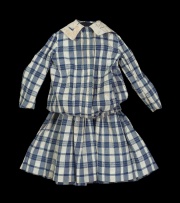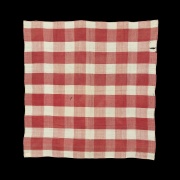Gingham
Revision as of 12:14, 27 April 2013 by (username removed)
Description
A plain weave, lightweight cotton fabric with a check pattern. Gingham cloth (Ging-Gang in Mayasian) was originally imported in the 17th century to Europe from southeast Asia as a striped fabric. By the mid 18th century, the mills of Manchester, were selling gingham with a blue and white checked pattern. Currently, gingham is typically made with two colors of yarn in both the warp and filling directions. The color changes are made at evenly spaced intervals to produce a balanced pattern of square blocks. Gingham is used for dresses, shirts, curtains, and children's clothing.
Synonyms and Related Terms
ging-gang; vichy (Esp.); guinga (Esp.); gingang (gekleeurd weefse) (Ned);
Other Properties
Low-textured, inexpensive
Hazards and Safety
Will shrink and wrinkle unless pretreated.
Authority
- Fairchild's Dictionary of Textiles, Phyllis G.Tortora, Robert S. Merkel (eds.), Fairchild Publications, New York City, 7th edition, 1996
- Edward Reich, Carlton J. Siegler, Edward Reich, Carlton J. Siegler, Consumer Goods: How to Know and Use Them, American Book Company, New York City, 1937
- Website address 1, Website address 1 Comment: www.fabrics.net
- Website address 2 Comment: www.apparelsearch.com
- Wikipedia, the free encyclopedia, at http://www.wikipedia.com Comment: http://en.wikipedia.org/wiki/Gingham (Accessed Nov. 2, 2005)
- Rosalie Rosso King, Rosalie Rosso King, Textile Identification, Conservation, and Preservation, Noyes Publications, Park Ridge, NJ, 1985
- Random House, Random House, Webster's Encyclopedic Unabridged Dictionary of the English Language, Grammercy Book, New York, 1997
- The American Heritage Dictionary or Encarta, via Microsoft Bookshelf 98, Microsoft Corp., 1998

